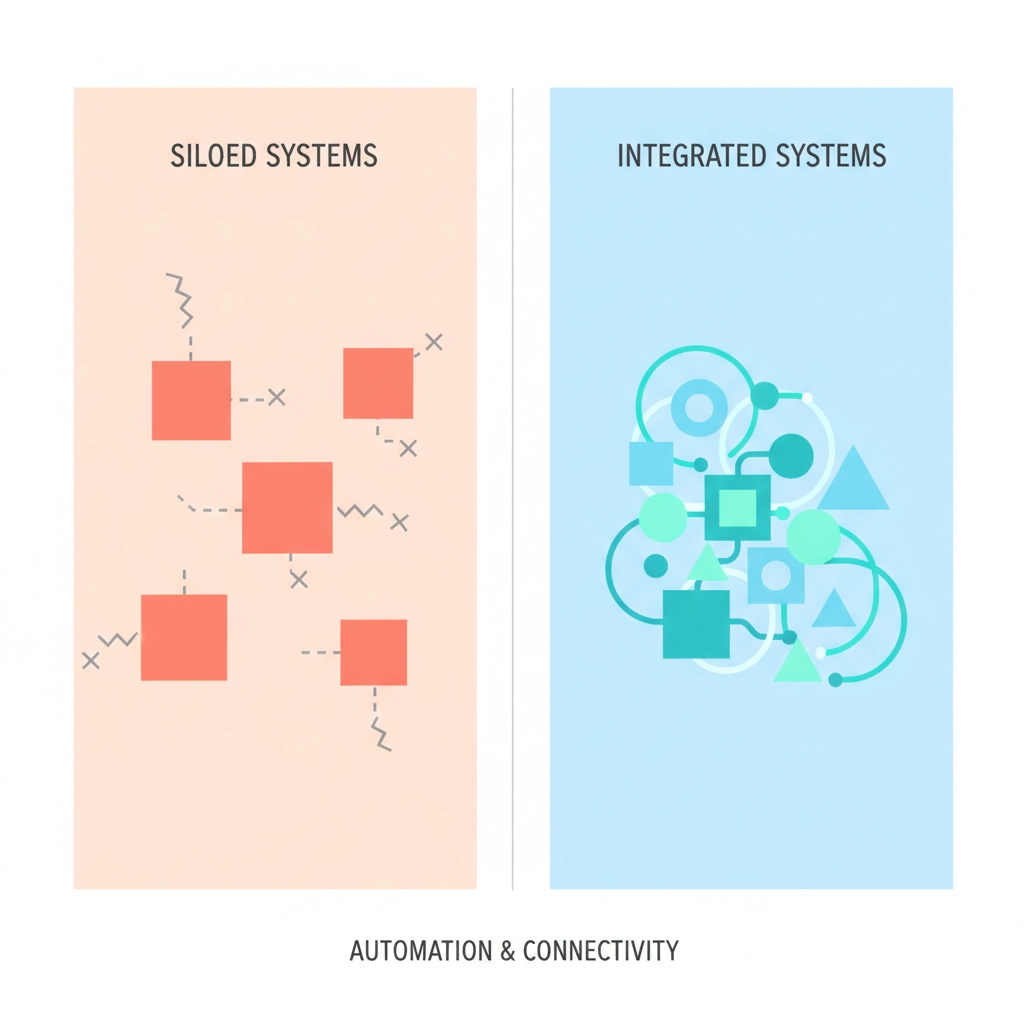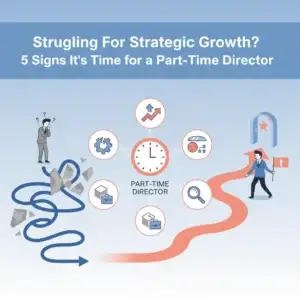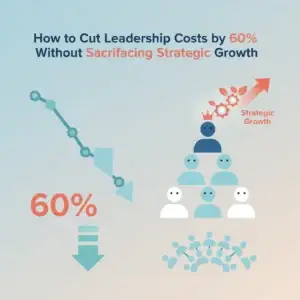Small and medium enterprise leaders are increasingly turning to automation to compete with larger organisations, but many fall into costly traps that transform promising efficiency gains into operational disasters. Research shows that 70% of digital transformation projects fail, often due to fundamental strategic errors rather than technology limitations.
The complexity of modern automation requires strategic expertise that most SMEs lack internally. This is precisely where fractional directors become invaluable: bringing board-level experience from multiple organisations to guide automation initiatives whilst avoiding the pitfalls that plague so many digital transformation efforts.
Mistake 1: Automating Broken Processes Instead of Optimising First
The most fundamental error SME leaders make is rushing to automate existing workflows without first examining whether those processes actually make sense. As management consultant Michael Hammer famously said: "If you automate a mess, you get an automated mess."
Many businesses assume automation will magically fix inefficient workflows, but automation simply amplifies whatever you feed into it. A poorly designed approval process that takes three days becomes a poorly automated process that still creates bottlenecks: just digitally.
How Fractional Directors Fix This: Experienced fractional executives bring process optimisation expertise from multiple industries. They conduct thorough process mapping exercises, asking critical questions about value-added steps, bottlenecks, and ideal workflows. Rather than automating immediately, they first eliminate unnecessary steps entirely, optimising the human process before considering technological enhancement.
Their external perspective helps identify process inefficiencies that internal teams often overlook due to familiarity blindness.

Mistake 2: Over-Automating or Choosing the Wrong Tasks
SME leaders often fall into the "automate everything" trap once tools are in place, applying automation logic to decision-heavy or high-context tasks that require human judgement. This results in impersonal, unresponsive systems that frustrate both employees and customers.
Automation works brilliantly for predictable, repeatable tasks like data entry, invoice processing, and appointment scheduling. It fails spectacularly when applied to nuanced decision-making, creative problem-solving, or relationship-building activities that require empathy and context.
How Fractional Directors Fix This: Seasoned fractional leaders understand the delicate balance between automation and human intervention. They create clear frameworks for determining what should and shouldn't be automated, focusing on repetitive, rules-based tasks that don't require strategic thinking.
Their cross-industry experience helps them identify which processes benefit from automation versus those requiring the human touch, ensuring technology enhances rather than replaces critical human capabilities.
Mistake 3: Creating Technology Silos Instead of Integrated Solutions
Many SMEs make siloed technology decisions that create integration nightmares down the road. When businesses automate large independent tasks separately, they create isolated systems that become increasingly difficult to integrate as the organisation grows.
This fragmented approach leads to data inconsistencies, workflow breakdowns, and the dreaded "manual handoff" between automated systems: defeating the purpose of automation entirely.
How Fractional Directors Fix This: Fractional executives bring strategic technology planning expertise, creating comprehensive automation roadmaps that ensure all systems work together cohesively. They understand enterprise architecture principles and can design integrated solutions from the outset.
Rather than automating massive independent workflows, they divide complex processes into smaller, manageable components that can be automated incrementally whilst maintaining system integration throughout.

Mistake 4: Failing to Get Team Buy-In and Ignoring Change Management
Even the most sophisticated automation tools fail without proper user adoption. SME leaders often underestimate the human element of automation, implementing solutions without adequate communication, training, or employee input.
Resistance typically stems from fear of job displacement or lack of clarity about how automation makes employees' jobs easier rather than redundant. Studies show that 65% of automation failures result from poor change management rather than technical issues.
How Fractional Directors Fix This: Fractional executives excel at change management, having guided multiple organisations through digital transformations. They understand that making people accept change is often harder than implementing the technology itself.
They involve users early in the design process, explain the rationale behind changes, and provide hands-on support during workflow transitions. Most importantly, they position automation as a tool working with the team, not replacing the team.
Mistake 5: Attempting Large-Scale Automation Instead of Taking Incremental Approaches
SME leaders often attempt to automate entire complex workflows at once, inspired by how large enterprises like Amazon automate comprehensive delivery services. However, small businesses lack the resources, infrastructure, and technical expertise to support such ambitious automation initiatives.
This "big bang" approach creates overwhelming complexity, increases the risk of failure, and often results in abandoned projects that waste significant time and resources.
How Fractional Directors Fix This: Fractional directors bring a methodical, phased approach to automation implementation. They understand that successful automation is built incrementally, with each small success creating momentum for the next phase.
They identify quick wins that demonstrate value early, building confidence and support for more comprehensive automation initiatives. Their experience across multiple organisations helps them recognise which specific problems to solve first, creating a systematic progression that builds upon success.

Mistake 6: Not Calculating ROI Properly
Many SME leaders implement automation without establishing clear metrics for success or understanding the true cost-benefit analysis. They focus on upfront software costs rather than long-term value creation, or fail to measure the actual impact on productivity and profitability.
Without proper ROI measurement, businesses continue investing in ineffective solutions or abandon potentially valuable automation initiatives before they reach maturity.
How Fractional Directors Fix This: Fractional executives bring financial acumen and measurement expertise to automation projects. They establish clear success metrics before implementation begins, including productivity gains, error reduction, and cost savings.
Their experience across multiple organisations provides benchmarks for what constitutes successful automation outcomes, helping SMEs make data-driven decisions about continued investment or necessary course corrections.
Mistake 7: Lacking Strategic Direction and Technical Expertise
The most overarching mistake SME leaders make is attempting to navigate complex automation decisions without sufficient expertise. Many businesses eager to harness automation's promise lack in-house technical knowledge or simply don't know where to begin.
This results in poor technology selection, inadequate implementation planning, and missed opportunities for competitive advantage. Without strategic guidance, automation becomes a series of disconnected tools rather than a coherent business transformation strategy.
How Fractional Directors Fix This: Fractional executives bridge the capability gap by bringing best-in-class strategy, hands-on leadership, and deep experience in digital transformation. They create clear, right-sized automation roadmaps grounded in specific business goals.
They manage the entire technology selection and implementation process, embedding best practices in risk management and data governance. Their board-level expertise provides critical strategic direction without the full-time executive cost, making sophisticated automation strategy accessible to resource-constrained SMEs.

The Strategic Advantage of Fractional Leadership in Automation
The complexity of modern automation requires expertise that most SMEs cannot justify hiring full-time. Fractional directors provide the strategic leadership necessary to avoid these costly mistakes whilst accelerating automation success.
They bring the experience of guiding multiple organisations through digital transformation, understanding both the technical and human elements required for successful implementation. For SMEs serious about leveraging automation for competitive advantage, fractional leadership represents a practical solution to accessing enterprise-level expertise at a sustainable cost.
The seven mistakes outlined above represent the difference between automation that transforms your business and automation that becomes an expensive burden. With proper fractional leadership, SMEs can navigate these challenges successfully, creating competitive advantages that were once available only to much larger organisations.


